The best vegetarian Mac and cheese recipes

If you only try one dairy-free cheese sauce recipe, I hope this is one. I’ve spent over 10 attempts to get it right, and it improves further thanks to the feedback from readers over the years.
What you like about this recipe is that it is not labor intensive. When you are a pasta chef, you pour some ingredients into a blender to make the sauce. After the pasta is finished, so is the cheese sauce!
There are hundreds of five-star reviews and I’m sure you’ll love it.
⭐⭐⭐⭐⭐ Featured Comments
“This is not only the best vegan Mac, but also the easiest! I’ve written it a lot and it’s simply perfect. It pairs well with veggies and tofu cubes to a comfortable meal. I find this Mac more filling and satisfying than traditional recipes.” – Audrey
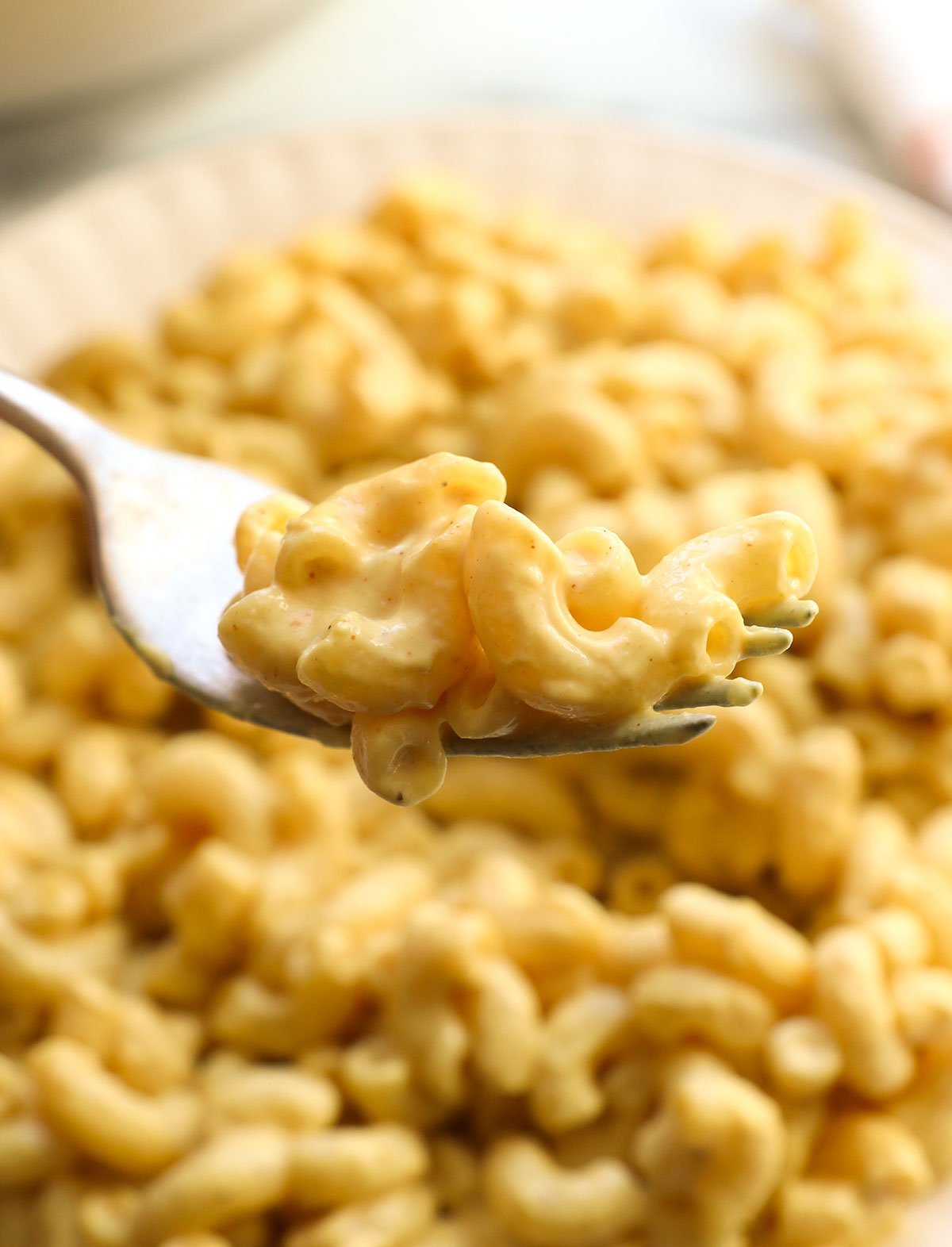

Vegetarian McN cheese ingredients
Here is what you need:
- cashew. Use unmarinated or baked cashews for the most neutral flavor. If you don’t have a high speed stirrer, soak the ingredients in boiling water for 10 minutes and stir to help them break down more easily.
- Nutritious yeast. In the vegan world, these slices are also called “Nof” and add a cheesy flavor to the sauce without using dairy. There is no other thing like this ingredient, but in the pinch you can replace it with a small amount of white flavor o, it also has a cheesy flavor.
- spices. Garlic powder, onion powder and chili powder add flavor to the sauce, while a pinch of turmeric is orange. (But this is optional!) While the sauce may be salty at first, remember that it is poured out a pound of pasta, which dilutes the flavor.
- Lemon juice. This adds a strong flavor and helps enhance the overall “cheesy” flavor. Use freshly squeezed lemon juice instead of bottled for the best flavor.
- mustard. This adds another layer of rich flavor and helps emulsify the cheese sauce.
- pasta. Macaroni cooks faster than almost every other pasta shape, making it a quick-cook dish. Choose gluten-free pasta to offer gluten-free recipes.
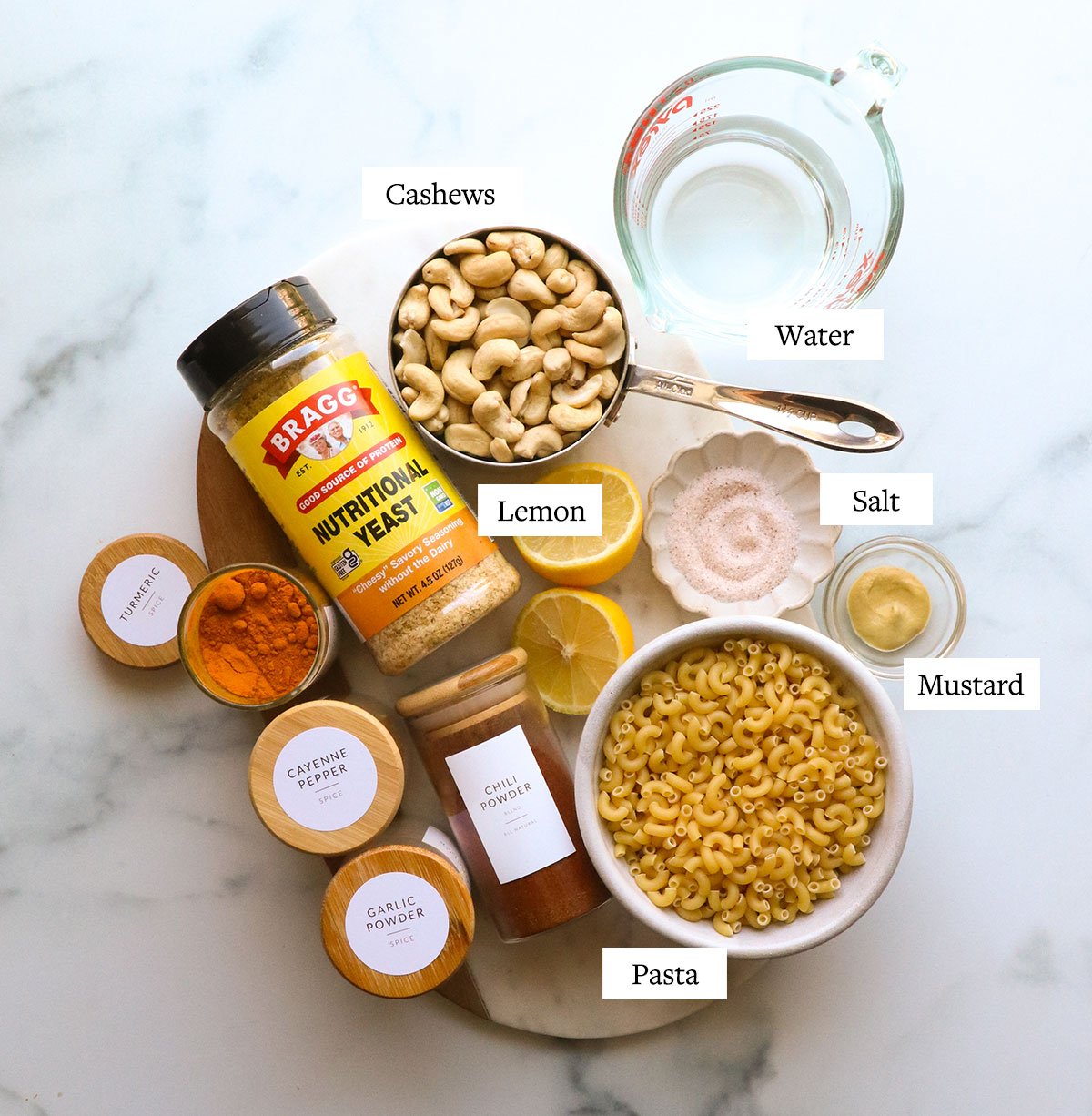

How to make vegan and cheese
Step 1:
Bring a large pot of salted water to a boil and cook the pasta according to the direction of the packaging. (I usually add a teaspoon of sea salt to the basin.)
While cooking noodles, mix together cashews, water, lemon juice, mustard, salt, nutritional yeast and spices. Secure the lid and mix until very smooth.
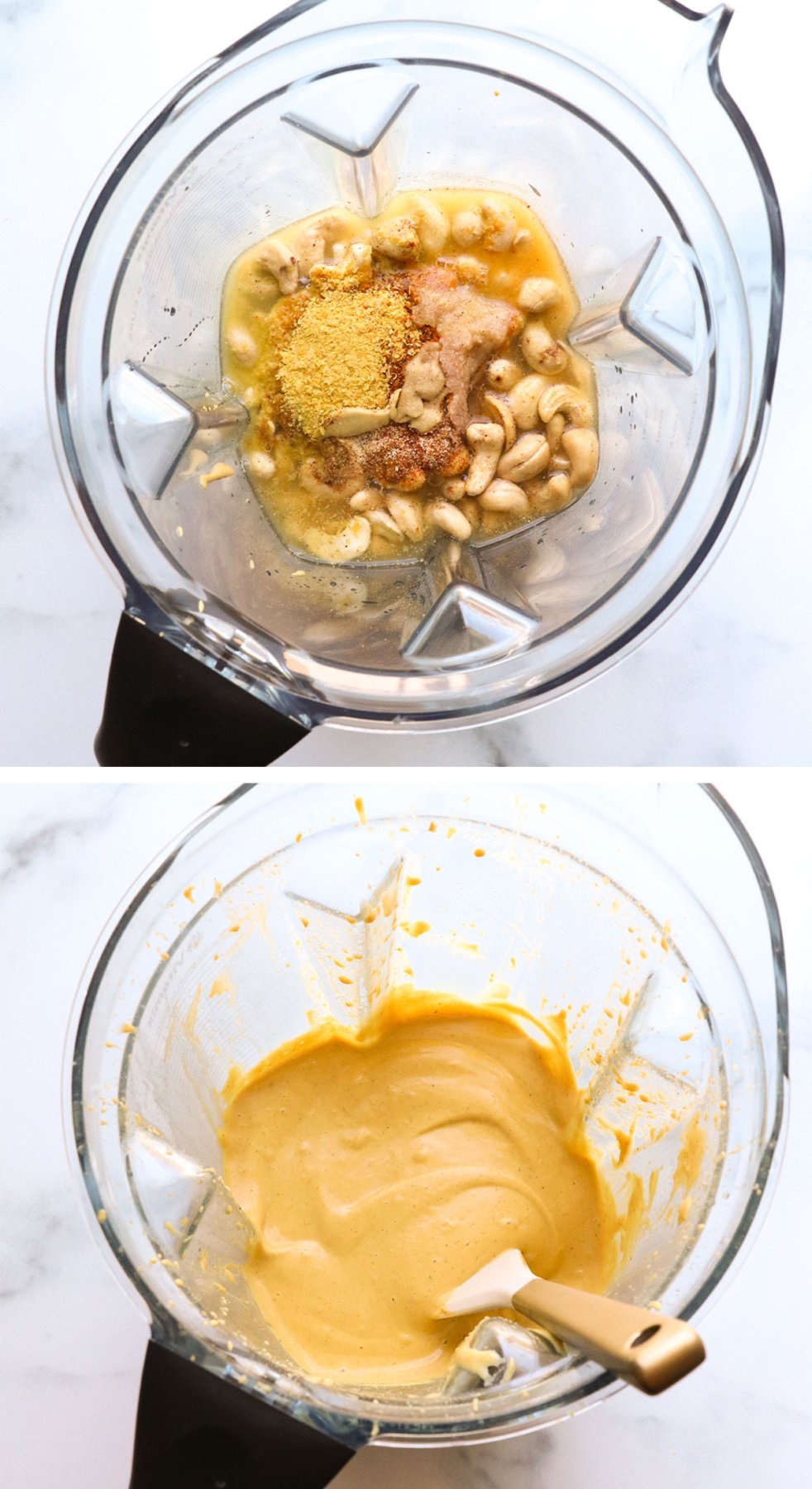

Poison tip
If you don’t have a high speed mixer, cover the cashews with 1 cup of boiling water and let them soak for 10 minutes. This should help soften cashews. Pour the soaked cashew nuts (and warmly soaked water) directly into the blender and add the rest of the ingredients to stir.
Step 2:
After the noodles are cooked, drain and return the warm noodles to a large pot.
Pour the seasoning into the pan and stir over medium heat until the Mac N’Cheese is warm and the noodles are covered well. Adjust the seasoning to season, adding more salt or lemon juice as needed.
If necessary, add a few tablespoons of water to help loosen the sauce and make it more creamy.
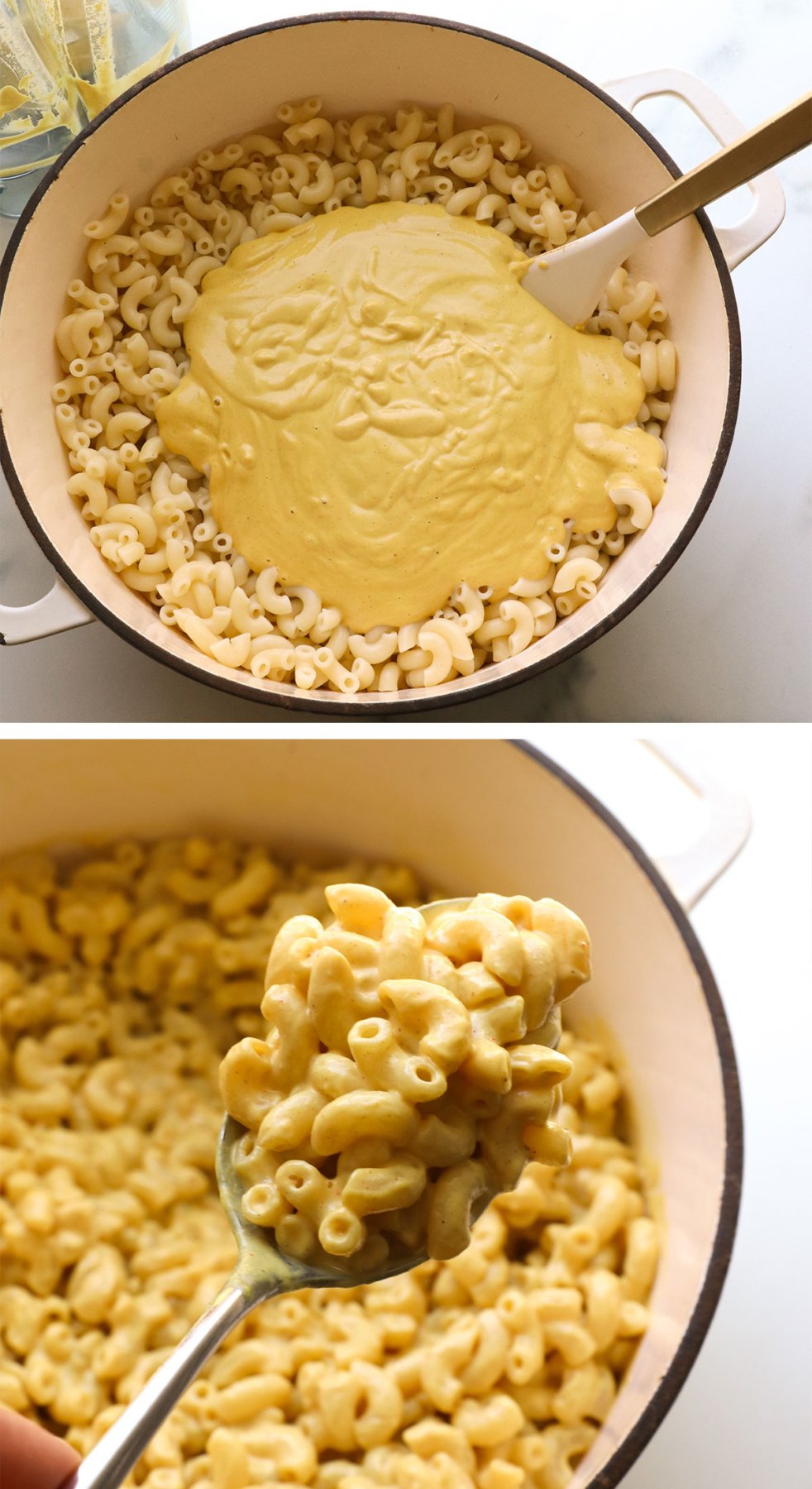

Step 3:
Keep this vegan Mac and cheese warm and accompany any other toppings you like. Add vegetables, such as steamed broccoli or mushroom bacon, and it is delicious. (yum!)
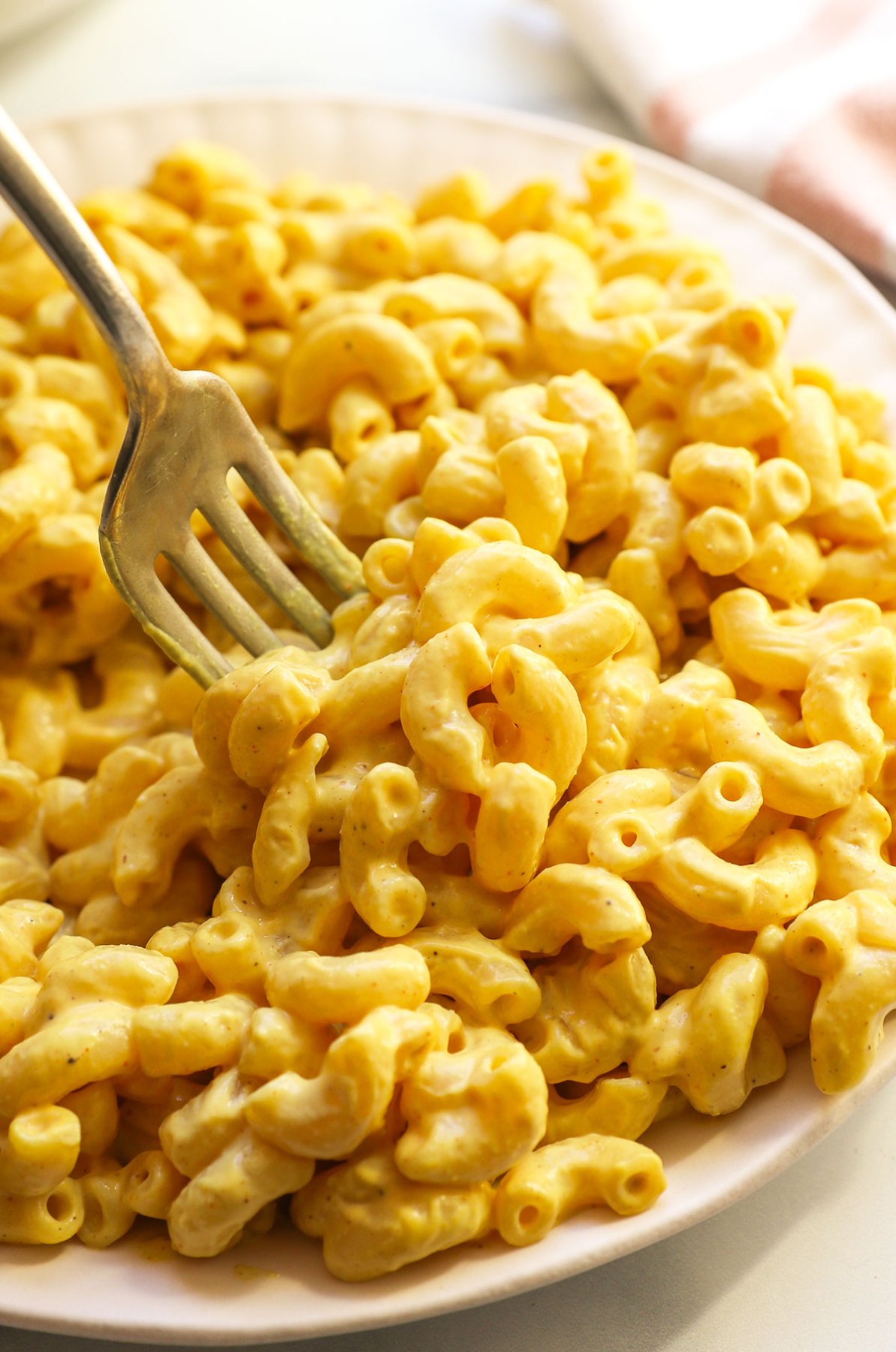

Storage Tips
Leftovers can be stored in an airtight container in the refrigerator for up to 5 days. The sauce thickens when refrigerated, but should be sparse again when heated.
Add water to the pasta while heating it on the stovetop.
notes: If you need to do this in advance, I recommend making the sauce and storing it in the refrigerator for up to 5 days. The pasta is best cooked freshly, then you can stir the sauce and heat until warm.
Flavor changes
- Grilled Mac and cheese: Add an extra 1/4 cup of water to this recipe to dilute the sauce (as it thickens when baking), then pour the cooked pasta and seasoning into a greased 9 x 13-inch baking dish. For bread crumbs, stir 3/4 cup crumbs with 1/4 cup melted vegan butter and 1/4 teaspoon salt, then stir in a small bowl, and sprinkle the mixture over the top of the Mac and cheese. (Use gluten-free bread crumbs if needed.) Bake the casserole in the oven and preheat to 350ºF for 10 minutes. When the timer goes out, turn on the broiler in the oven and let the crumbs brown for 1 to 2 minutes until the top looks golden. Watch closely to avoid burning! For gluten-free toppings, try chopped almonds or other crushed nuts.
- Green Chilean Mac and Cheese: Replace 1/2 cup water with 4 ounces of green chili. You can also add a few slices of jam of jalapeno for extra flavor and spice. (This is inspired by vegetarian cornflake cheese, my favorite vegetarian cheese dip!)
- Taste mac and cheese. Did you know that the white o tastes similar to Parmesan cheese? If you don’t have nutritional yeast on hand, you can add a teaspoon of white flavored o to this recipe to help spread out all the cheesy flavorings in this recipe. This is always a good idea when starting with the taste o-taste, as it can quickly overwhelm the recipe, so if you are not sure about the taste, just use 1/2 teaspoon.
- 1½ cup cashew (Unbaked or brine)
- 2 to 3 spoon Fresh lemon juice
- ¾ cup water
- 1½ teaspoon Fine sea salt
- ¼ cup Nutritional yeast
- ½ teaspoon Chili powder
- ¼ teaspoon Garlic powder
- ¼ teaspoon turmeric
- pin (Optional)
- ½ teaspoon Spicy brown mustard (Optional)
- 16 ounce Elbow or shell pasta (Gluten-free if needed)
-
Prepare pasta according to the packaging instructions. Add a teaspoon of salt to the cooking water to make the noodles season well.
-
While cooking pasta, add cashew nuts, 2 tablespoons of lemon juice, water, salt, nutritious yeast, chili powder, garlic, turmeric, chili (if used), and mustard in a high-speed mixer. Secure the lid and mix until silky smooth. If the mixture is too thick, add another tablespoon or two tablespoons of water and mix again. You can taste the sauce, but remember that pouring it out a pound of pasta will greatly dilute the flavor.
-
Once the pasta has become soft, drain and return it to the pan. Stir the cheese sauce and adjust the seasoning to season. If necessary, add another tablespoon of lemon juice to make the flavor brighter. Serve with any toppings or attachments you prefer, such as steamed broccoli.
-
Leftovers can be stored in an airtight container in the refrigerator for up to 1 week. When cold, the Mac and cheese thicken, so it may require water when reheating it, plus extra salt.
No high-speed mixer? In this case, use 1 cup of boiling water and then immerse the cashews in hot water for at least 10 minutes before mixing. This will help them break down more smoothly.
Looking for nut-free recipes? Try the Southwest Sweet Potato Mac and Cheese, or my Nut-Free Vegetarian Cheese Sauce.
Video Note: I made a mistake in this recipe in the video and used only 1 cup of cashew nuts. The results are still delicious, so if you lack cashews, feel free to try using that amount without changing the amount of other ingredients.
Update Note: The recipe updated new photos in November 2024 and selected the option to use 1 tablespoon of lemon juice based on readers’ feedback. You can see the original recipe here.
Calories: 352KCAL | carbohydrate: 51g | protein: 13g | Fatty: 12g | Saturated fat: 2g | Polyunsaturated fat: 2g | Monounsaturated fat: 6g | sodium: 449mg | Potassium: 325mg | fiber: 3g | sugar: 3g | Vitamin A: 38IU | Vitamin C: 2mg | calcium: twenty threemg | iron: 3mg
More recipes
If you try this vegan Mac and cheese recipe, Please leave a comment and a star rating belowlet me know you like it.




